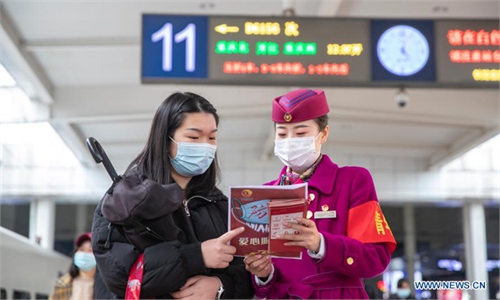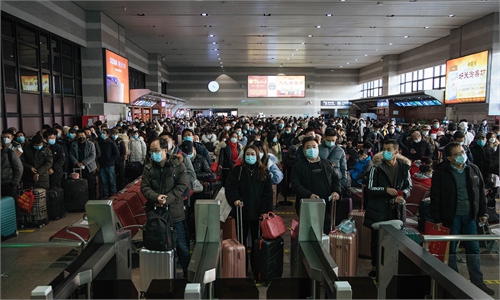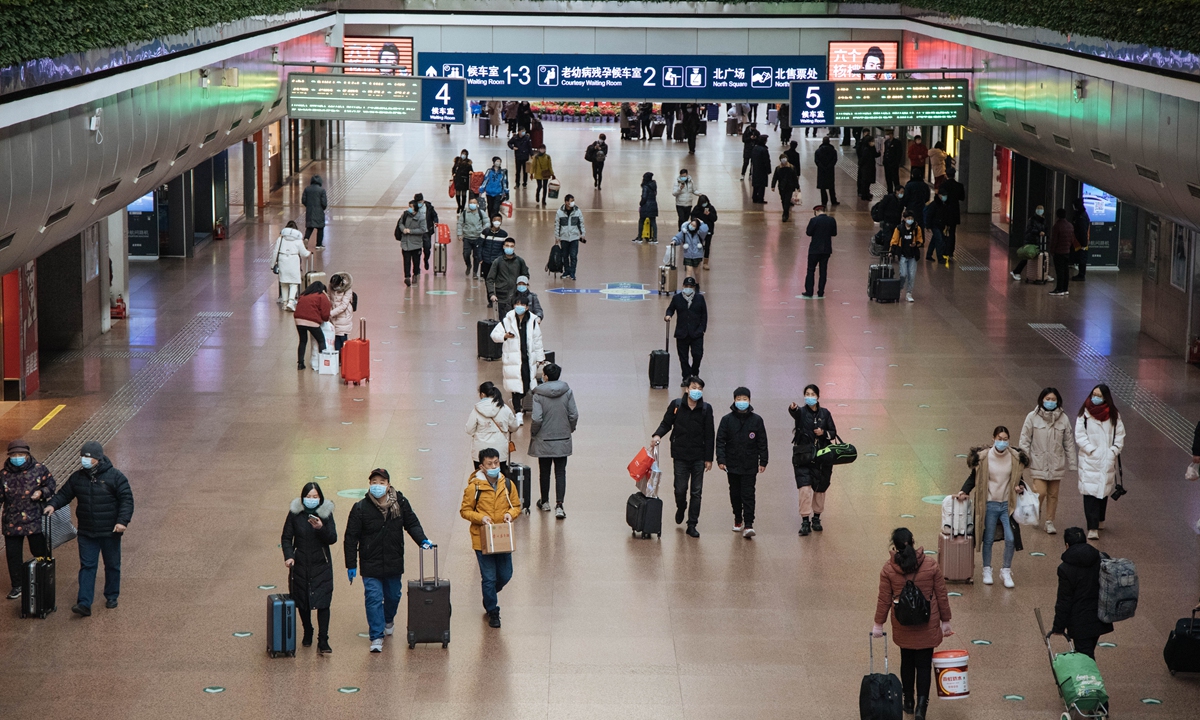
China's 40-day Spring Festival travel rush has kicked off on Thursday. Beijing West Railway Station expects the holiday travel rush to peak between February 16-18, and an estimated 70,000 passengers on average arriving at the station a day. Photo: Li Hao/GT
Chunyun or the Spring Festival travel rush officially kicks off on Thursday, yet this is the first time that China encourages residents to celebrate the country's most important traditional holiday at their place of working or living to support COVID-19 control work amid sporadic cluster infections that have broken out in multiple places in China.
Dubbed the world's largest human migration, this year's Spring Festival travel rush, estimated at around 1.152 billion trips, is 60 percent decline than that of 2019.
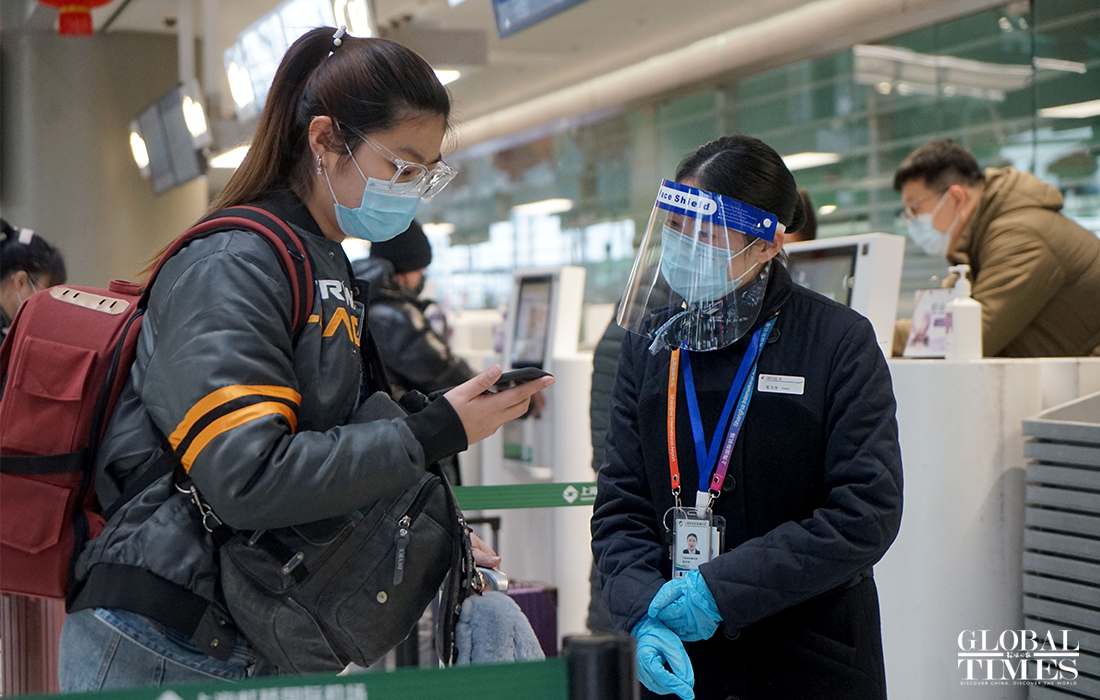
Photo: Chen Xia/GT
To make this unusual Spring Festival as happy, safe and wonderful as usual, officials from six central government departments announced at a press conference on Wednesday a slew of considerate and warm measures. The aim is to guarantee people who choose not to return to hometown could fully enjoy the holiday with their families, meanwhile, those who return would not be affected by rigid epidemic-control measures.
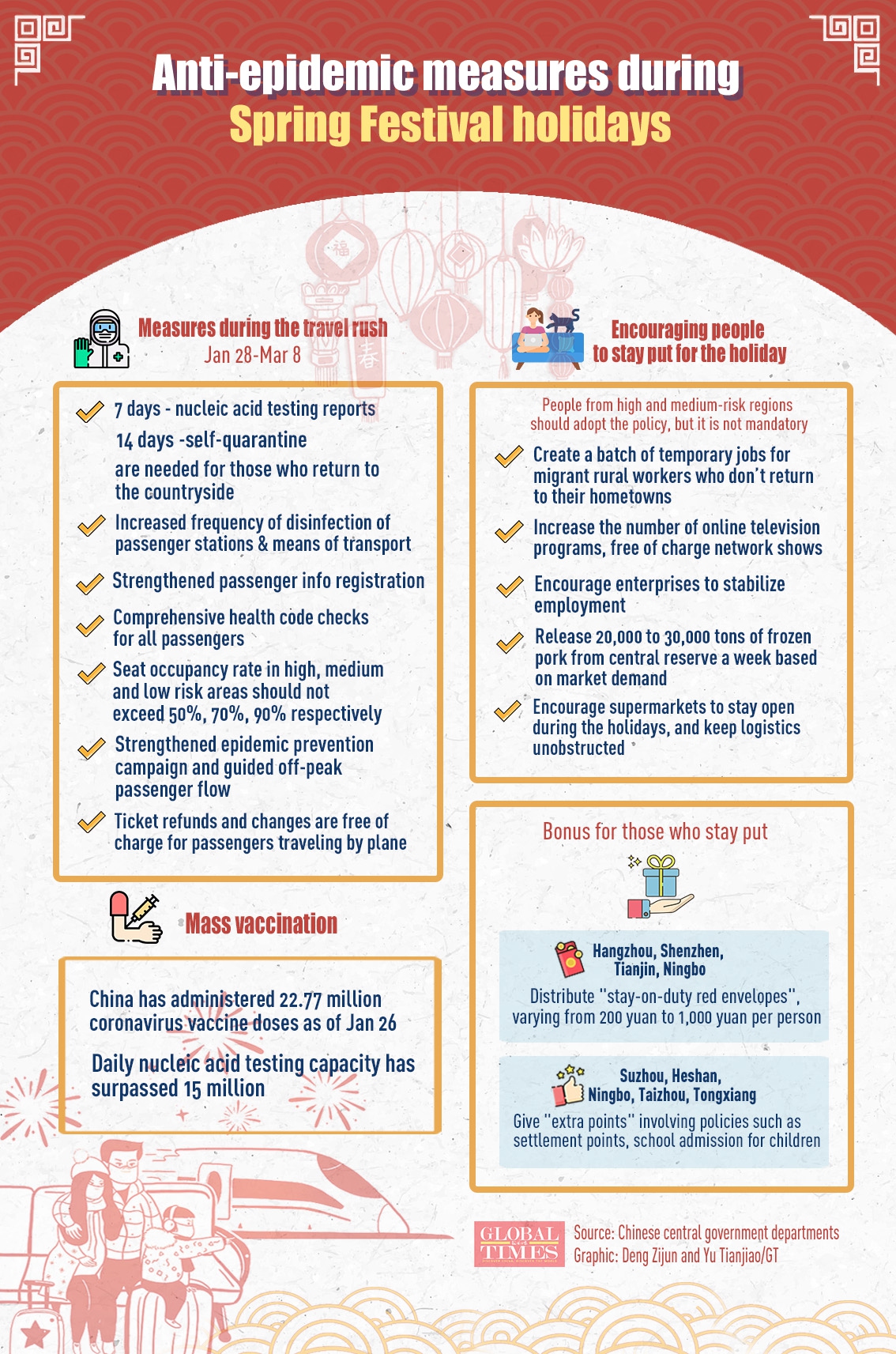
Anti-epidemic measures during Spring Festival holidays. Graphic: Deng Zijun and Yu Tinjiao/GT
Opt to stay
In the weeks ahead of the Spring Festival, authorities have taken measures to encourage people to celebrate the upcoming Spring Festival in place where they work and live, including increasing the provision of online television programs, free online platform entertainment shows and encouraging enterprises to provide free mobile data.
"Chinese people's choice to stay for Spring Festival will provide the biggest support to the country's anti-virus drive," Zhao Chenxin, secretary-general of the National Development and Reform Commission (NDRC), said at a Wednesday press conference held by the State Council.
China is facing pressure with domestic outbreaks and imported cases at the same time. The latest flares-up happened in several regions, including North China's Hebei Province, Northeast China's Heilongjiang and Jilin provinces and Shanghai Municipality, with the number of daily new infections continuing to increase.
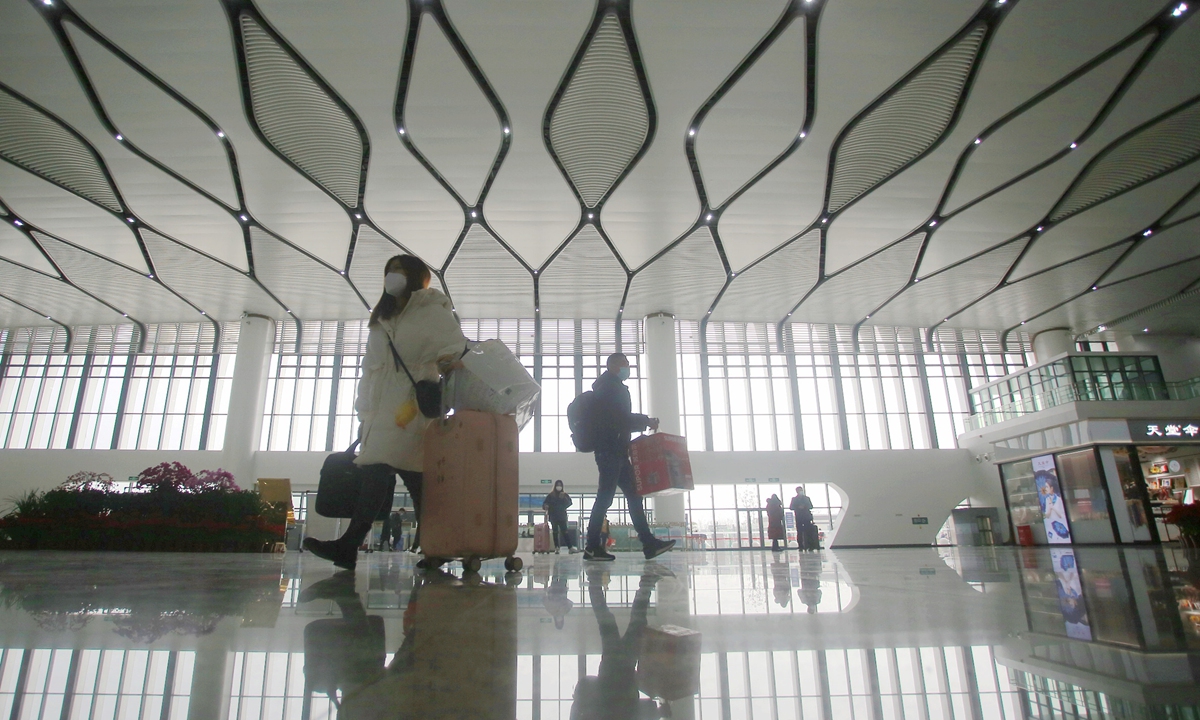
Passengers enter Yangzhou East Railway Station in East China's Jiangsu Province on Wednesday, a day before the Spring Festival travel rush officially kicks off on Thursday. Photo: VCG
A year ago, many people had left for hometown for the Spring Festival but later were stuck there due to COVID-19 epidemic. In 2021, many Chinese people have decided to stay where they work.
In sharp contrast with previous years when ticket for train departing from big cities such as Beijing and Guangzhou are booked in seconds, the Global Times found tickets are plentiful, even for the busiest travel days. Air tickets are heavily discounted, with some routes 20 to 30 percent discounted.
"We believe that as long as everyone unites to fight against the epidemic and the country's epidemic prevention and control situation continues to improve, any regret we feel about missing our family reunion this Spring Festival will definitely be worth it," Meng Xiatian a resident from North China's Hebei Province who will stay in Beijing with his family for the holiday, told the Global Times.
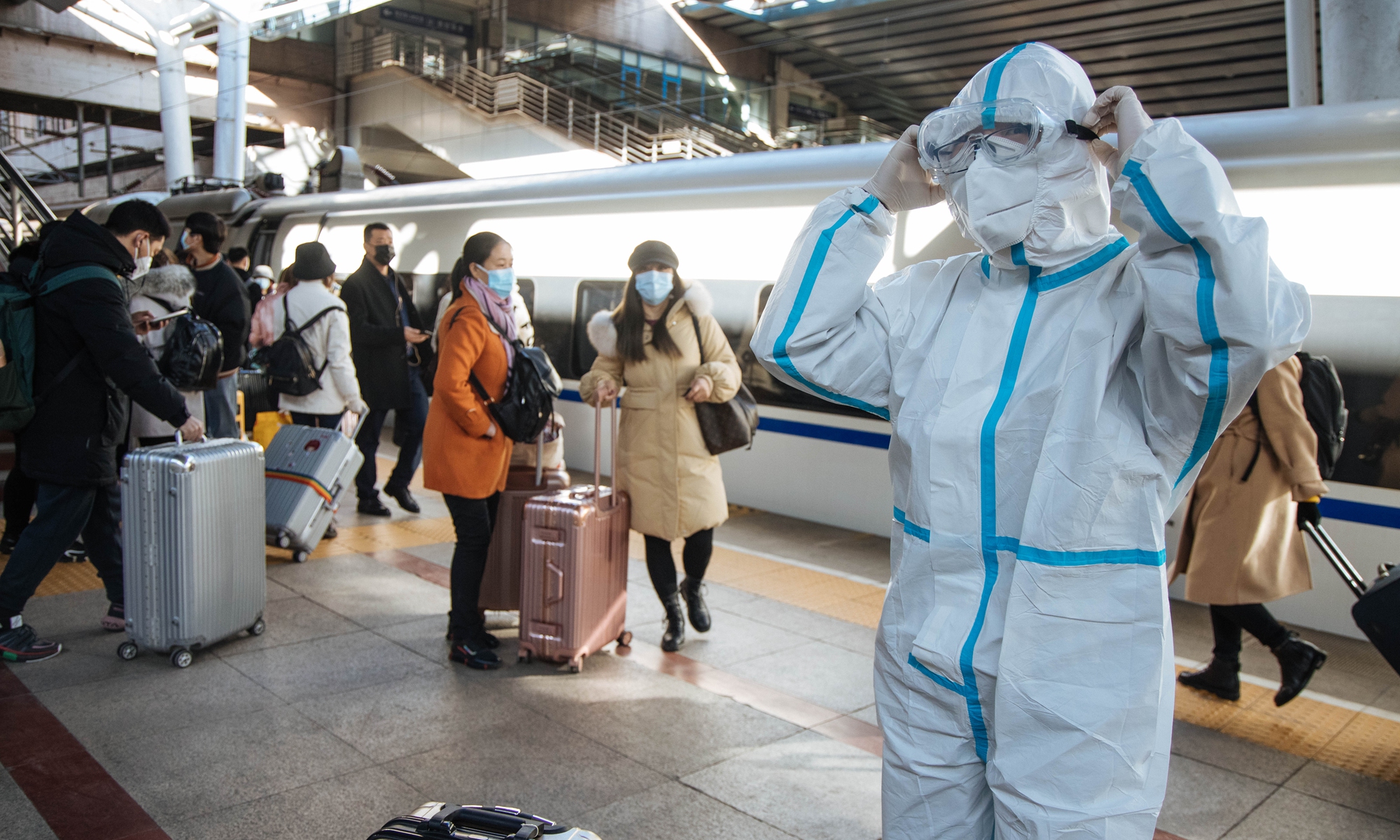
China's 40-day Spring Festival travel rush has kicked off on Thursday. Beijing West Railway Station expects the holiday travel rush to peak between February 16-18, and an estimated 70,000 passengers on average arriving at the station a day. Photo: Li Hao/GT
There are also people who still stick to the tradition and travel back to hometown. "I had to go back because Spring Festival is the only time I can get a long break. I tried to avoid causing trouble for others and I made sure I was well-protected on my way home," Feng Nifeng, an employee working at a Beijing's massage parlor, told the Global Times. Feng decided not to wait for the rush, and headed back to Northwest China's Shaanxi Province in mid-January.
Zhao stressed at the Wednesday conference that "staying in your city of work for the upcoming Spring Festival is not mandatory." Local governments should not adopt "a one-size-fits-all approach" to prevent residents from returning to their hometowns. They should make it convenient for those who need to return to their hometowns.
The performance of local officials drastically varies, and some overreact and fail to take the tough epidemic fight with a humane approach, Yu Shaoxiang, chief research fellow with the Chinese Academy of Social Sciences, told the Global Times.
Wu Chao, an official of a sub-district office in Hengfeng county, East China's Jiangxi Province, is responsible to register returnees. "We're registering those who will come back and we will seek the right way to deal with any [quarantine] violations," Wu said.
Rural dwellers have a different mindset and can be indifferent to anti-epidemic measures. Many of them are quite uncooperative, local officials said, noting the complexity of grassroots management.
Influence on economy
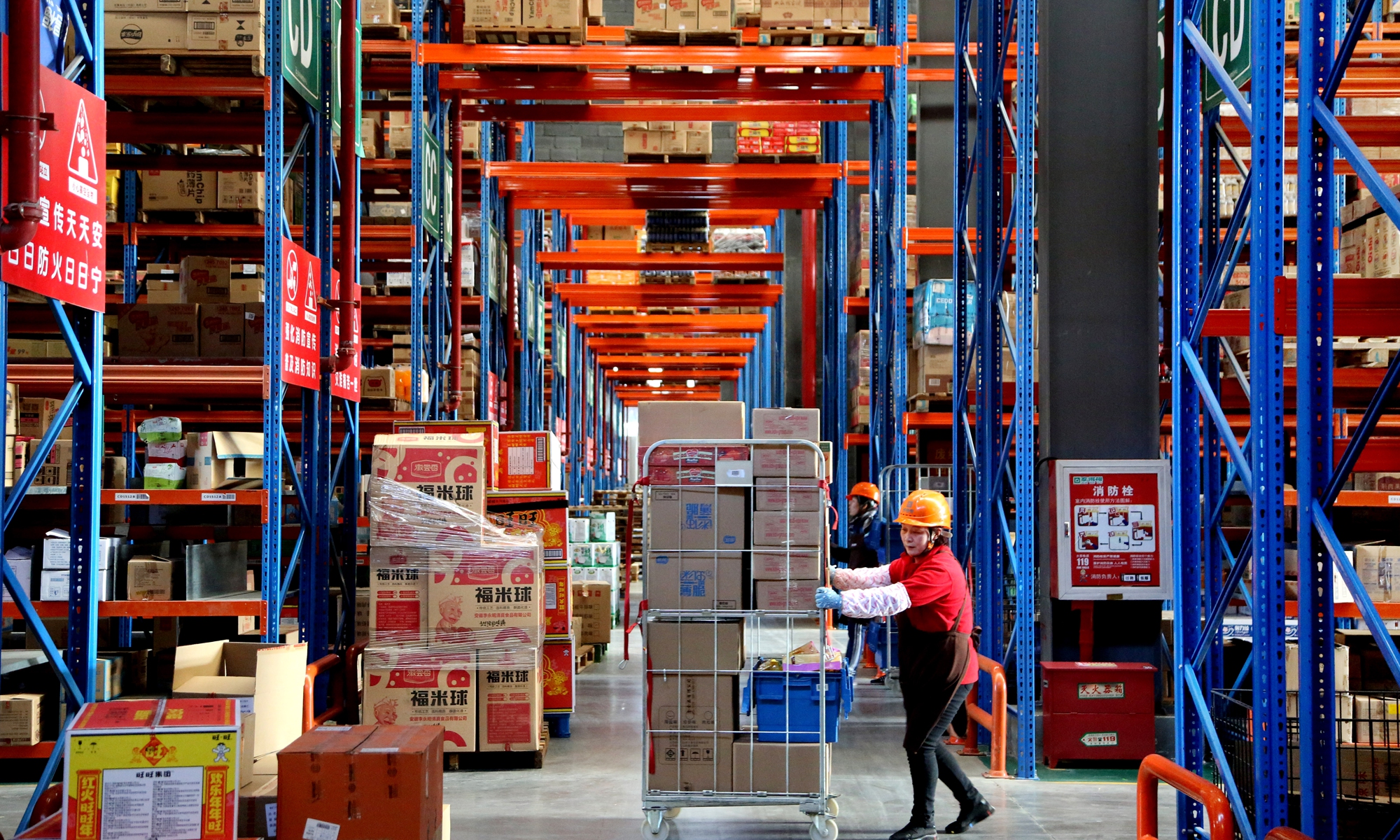
A worker arranges goods at a warehouse of an e-commerce platform at Lianyungang, East China's Jiangsu Province. File Photo: CNSphoto
The policy that encourages people to spend Spring Festival in the place they work will cause consumption, particularly in inland cities, to drop to some extent. Some industries like tourism will also be negatively impacted, analysts said. But it will be a bonus to manufacturing as companies will be able to continue production and churn out products for clients.
"As most Chinese migrant workers and employees are clustered in large, coastal cities, the new policy would bring some negative impact to the consumption sector in smaller, inland areas, which would in turn drag general consumption down to some extent," Hu Qimu, chief researcher at the Sinosteel Economic Research Institute, told the Global Times on Wednesday, adding that some industries might also be negatively influenced, especially culture-related industries and tourism.
But he argued that such impact will be limited and will not halt the general trend of economic recovery in China, citing several reasons including government support and manufacturing momentum.
Companies and experts told the Global Times that residents' not going home for the Spring Festival is a bonus for China's manufacturing industry, as companies will not have to worry about the usual post-holiday staff shortages, and they will be able to continue to fulfill orders.
Chen Fangfang, general manager of a Shaoxing-based medical products plant under Zhende Medical Co, said that 600 non-local employees would stay, and they will receive a bonus of 5,000 yuan ($773).
"Because the factory has a lot of orders, our employees have voluntarily asked to continue working for several days during the holiday, so we'll give them holiday pay according to government regulations," Chen told the Global Times on Wednesday.
A director of human resources surnamed Zhang at Shaoxing Hucais Laser Materials Technology Co, which is based in the city's Yuecheng district, told the Global Times that some staff, such as manufacturing engineers, would continue to work over the Spring Festival holidays as it had a "gratifying" amount of orders placed since January. The company will give staff bonuses, including a 300-yuan subsidy per person each day, paid holiday and free dining.
The government will roll out policies to encourage residents to shop during the holiday. These include coupons, free visits to tourist sites and sales promotions, Chinese officials said on Wednesday morning.
Under such policies, some companies, like e-commerce websites or delivery firms, will benefit. Philip Kuai, CEO of on-demand delivery platform Dada Group, told the Global Times that the company is optimistic that sales of fresh food and wine would see growth this year on its platforms. Non-local orders are likely to rise as people are expected to purchase gifts for relatives at home.
In general, experts expect that China's economy will still show an upward trend in the first quarter. "Despite consumption obstacles, manufacturing orders are still flowing into China because of the overseas pandemic hit," Hu said.
Ye Hang, an economics professor at the College of Economics at Zhejiang University, told the Global Times that China's strong economic recovery since the second half of 2020 is likely to continue. He expects China's economy to grow by about 5 percent in the first quarter this year, if the coronavirus does not resurge too violently.
A United Bank of Switzerland (UBS) economist forecast that China's GDP is expected to grow by more than 8 percent in the first quarter of 2021, a notable rise from the -6.8 percent in the first quarter of 2020.

